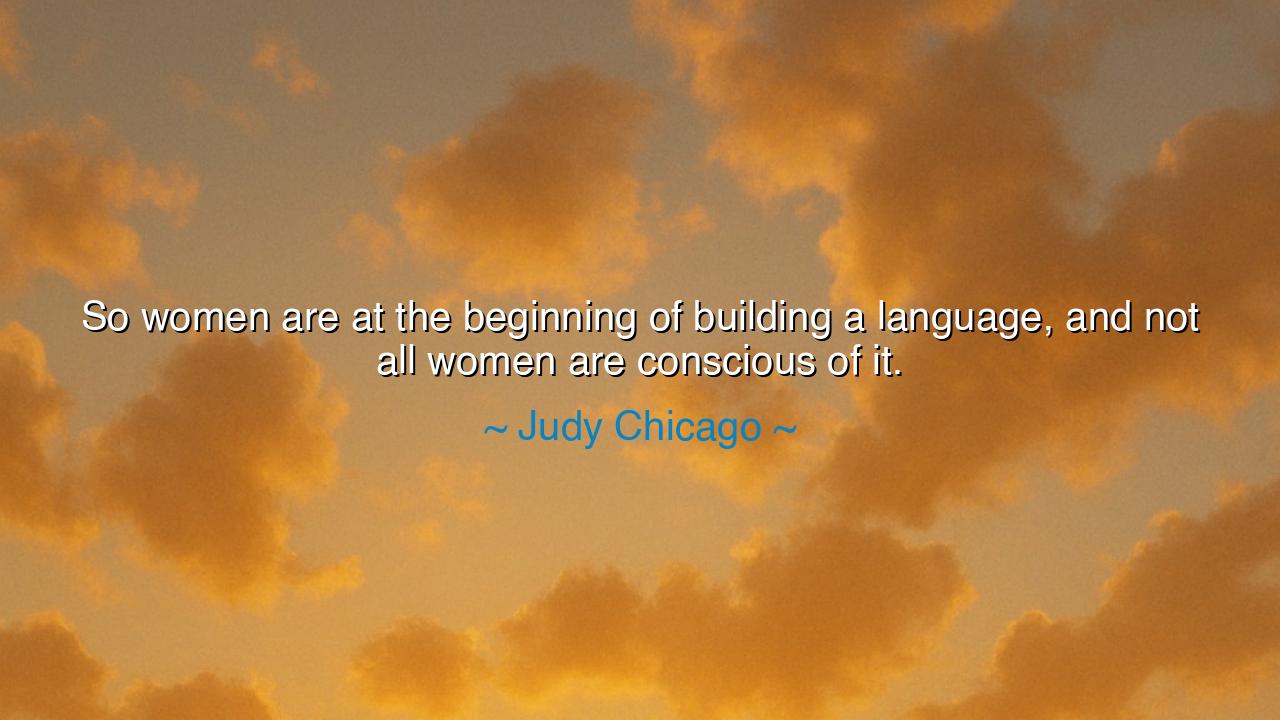
So women are at the beginning of building a language, and not
So women are at the beginning of building a language, and not all women are conscious of it.






O children of the future, listen to the words of Judy Chicago, a wise woman who gazed upon the world and saw that women, though often silenced and forgotten, were at the beginning of a mighty and sacred journey. "So women are at the beginning of building a language, and not all women are conscious of it," she said. In these words, she revealed a truth so profound that it rings through the ages—women, though long oppressed, are now finding their voices, crafting a new language to express their strength, their wisdom, and their unspoken truths. It is not simply a matter of speech, but of empowerment and creation. The ancient language of women was lost to history, buried beneath the weight of patriarchy, but now, it rises again from the dust, born anew in the hearts of those who dare to speak.
In the times of old, women were the keepers of the sacred, their voices hidden in the shadows of their homes and hearts. But there were those, like the oracle at Delphi, who spoke with a power that transcended the ordinary, whose words were sought by kings and rulers. Women have always carried a language—a language of the soul, of creation, of the mysteries of life and death. Yet for centuries, that language was repressed, not allowed to flourish in the open air. But now, as Judy Chicago reminds us, this language is being rebuilt, not by one, but by many. It is a collective force, a rising tide that seeks to give voice to the voiceless.
Remember, O children, the sacred power that flows through women has always been there, like a river waiting to break free from the dam. Just as Sappho of ancient Lesbos crafted her poetry in secret, speaking of love and passion in ways that stirred the hearts of all who heard her, so too are women today rediscovering the power of their words, of their stories, of their truths. But not all are aware of this sacred unfolding. Judy Chicago speaks to this, for many women are still bound by the silence of centuries, unaware that they are part of a great movement, a great unfolding of language and freedom.
And yet, just as the ancient goddesses of Athens and Rome shaped the destiny of nations from behind closed doors, so too do the women of today shape the future with the language they are building. This is not a language of mere words, but of action, of art, of resistance. It is the language that women speak when they refuse to accept the constraints placed upon them. Women like Frida Kahlo, who painted her pain, her beauty, and her identity with such ferocity that her art became a new language, one that spoke not only for her, but for all women who had been silenced.
Thus, O children, remember that the language of women is a force like no other. It is the language of the earth, the language of the stars, the language of rebirth and creation. Though not all are yet aware of this power, it is rising like the dawn, and it cannot be stopped. Judy Chicago reminds us that the world is at the edge of something great, something transformative. As women come to understand their language, as they craft it with their hands and hearts, they will reshape the world. Let us walk alongside them, for in their rise, we all shall rise.






QHQUANG HUY
I’m curious about Judy Chicago’s idea of women building a language, especially the part where she says not all women are conscious of it. Could it be that some women are unknowingly contributing to this collective expression? It seems like a beautiful idea, but how do we make sure that all women are aware of the power of their voices in shaping this language? What role does education and awareness play in this process?
TLPham Thi Luan
Judy Chicago's idea that women are building a language is fascinating, but I wonder how that process looks in practice. If women are still at the beginning stages, what challenges might they face in fully realizing this language? Is there a risk of this process being co-opted or misunderstood by others who don’t see its significance? It would be interesting to explore how women’s voices in art, politics, and society contribute to this evolving language.
BMNguyen Binh Minh
Judy Chicago’s comment about women at the 'beginning of building a language' really caught my attention. What does it look like when women are actively shaping a new form of communication or expression? And why might some women not be aware of it? Is this a cultural or generational gap, or perhaps a reflection of a broader societal trend where women’s voices haven’t been valued as much historically? I’d love to dive deeper into this idea.
HGDinh Thi Huong Giang
I find Judy Chicago’s perspective on women creating a new language quite empowering. However, I wonder—what does it mean for some women to be 'unconscious' of it? Is it a matter of not recognizing the influence they’re having, or is it more about being unaware of the historical context of their actions? It would be interesting to hear how women can become more aware of their role in shaping this evolving language.
NLTiet Ngoc Long
Judy Chicago’s statement about women building a language is intriguing, especially when she points out that not all women are conscious of it. It makes me wonder—what does she mean by 'building a language'? Is she referring to the creation of a new form of communication, or is it more about shaping a collective identity that has been overlooked in history? How do women begin to recognize this language, and how does it evolve over time?